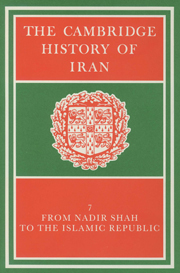Book contents
- Frontmatter
- PART 1 THE POLITICAL FRAMEWORK, 1722–1979
- PART 2 FOREIGN RELATIONS
- PART 3 ECONOMIC AND SOCIAL DEVELOPMENTS
- PART 4 RELIGIOUS AND CULTURAL LIFE, 1721–1979
- 19 RELIGIOUS FORCES IN EIGHTEENTH- AND NINETEENTH-CENTURY IRAN
- 20 RELIGIOUS FORCES IN TWENTIETH-CENTURY IRAN
- 21 POPULAR ENTERTAINMENT, MEDIA AND SOCIAL CHANGE IN TWENTIETH-CENTURY IRAN
- 22 PRINTING, THE PRESS AND LITERATURE IN MODERN IRAN
- 23 PERSIAN PAINTING UNDER THE ZAND AND QĀJĀR DYNASTIES
- 24 THE ARTS OF THE EIGHTEENTH TO TWENTIETH CENTURIES
- Genealogical tables
- Bibliographies
- Index
- References
19 - RELIGIOUS FORCES IN EIGHTEENTH- AND NINETEENTH-CENTURY IRAN
from PART 4 - RELIGIOUS AND CULTURAL LIFE, 1721–1979
Published online by Cambridge University Press: 28 March 2008
- Frontmatter
- PART 1 THE POLITICAL FRAMEWORK, 1722–1979
- PART 2 FOREIGN RELATIONS
- PART 3 ECONOMIC AND SOCIAL DEVELOPMENTS
- PART 4 RELIGIOUS AND CULTURAL LIFE, 1721–1979
- 19 RELIGIOUS FORCES IN EIGHTEENTH- AND NINETEENTH-CENTURY IRAN
- 20 RELIGIOUS FORCES IN TWENTIETH-CENTURY IRAN
- 21 POPULAR ENTERTAINMENT, MEDIA AND SOCIAL CHANGE IN TWENTIETH-CENTURY IRAN
- 22 PRINTING, THE PRESS AND LITERATURE IN MODERN IRAN
- 23 PERSIAN PAINTING UNDER THE ZAND AND QĀJĀR DYNASTIES
- 24 THE ARTS OF THE EIGHTEENTH TO TWENTIETH CENTURIES
- Genealogical tables
- Bibliographies
- Index
- References
Summary
The Safavid period marks an obvious watershed in the religious history of Iran in that it witnesses the elevation of Twelver Shi‘ism to the position of state religion and the practical fusion of Iran and Shi‘ism into a single religio-national entity. Although the proximate causes of this process are to be sought in a Türkmen military invasion of Iran from the west and north-west, followed by an influx of Shī‘ī scholars from Arab lands, there can be no doubt that a species of marriage between Shi‘ism and the Iranian national consciousness had been concluded by the close of the Safavid era. The marriage has proved lasting, and its effects irreversible. Yet the precise content of the Shī‘ī-Iranian identity and the forms of expression that were to be assumed by Shi‘ism on Iranian soil were not fully formulated in the Safavid period. Indeed, it was only when the Safavids were driven from the scene in the first quarter of the 18th century that Iranian Shi‘ism became emancipated from all essential dependence on the state, and was able to embark on a process of self-elaboration and internal differentiation that makes of the post-Safavid period one of great interest and richness. The 18th century has been called “by far the blackest period in the history of Islamic Iran”, and the anarchy that prevailed throughout much of the period goes some way to justifying this judgement. The 19th century, too, was one of almost uninterrupted socio-political decline, arrested only by the beginnings of westernizing reform.
- Type
- Chapter
- Information
- The Cambridge History of Iran , pp. 703 - 731Publisher: Cambridge University PressPrint publication year: 1991
References
- 1
- Cited by

